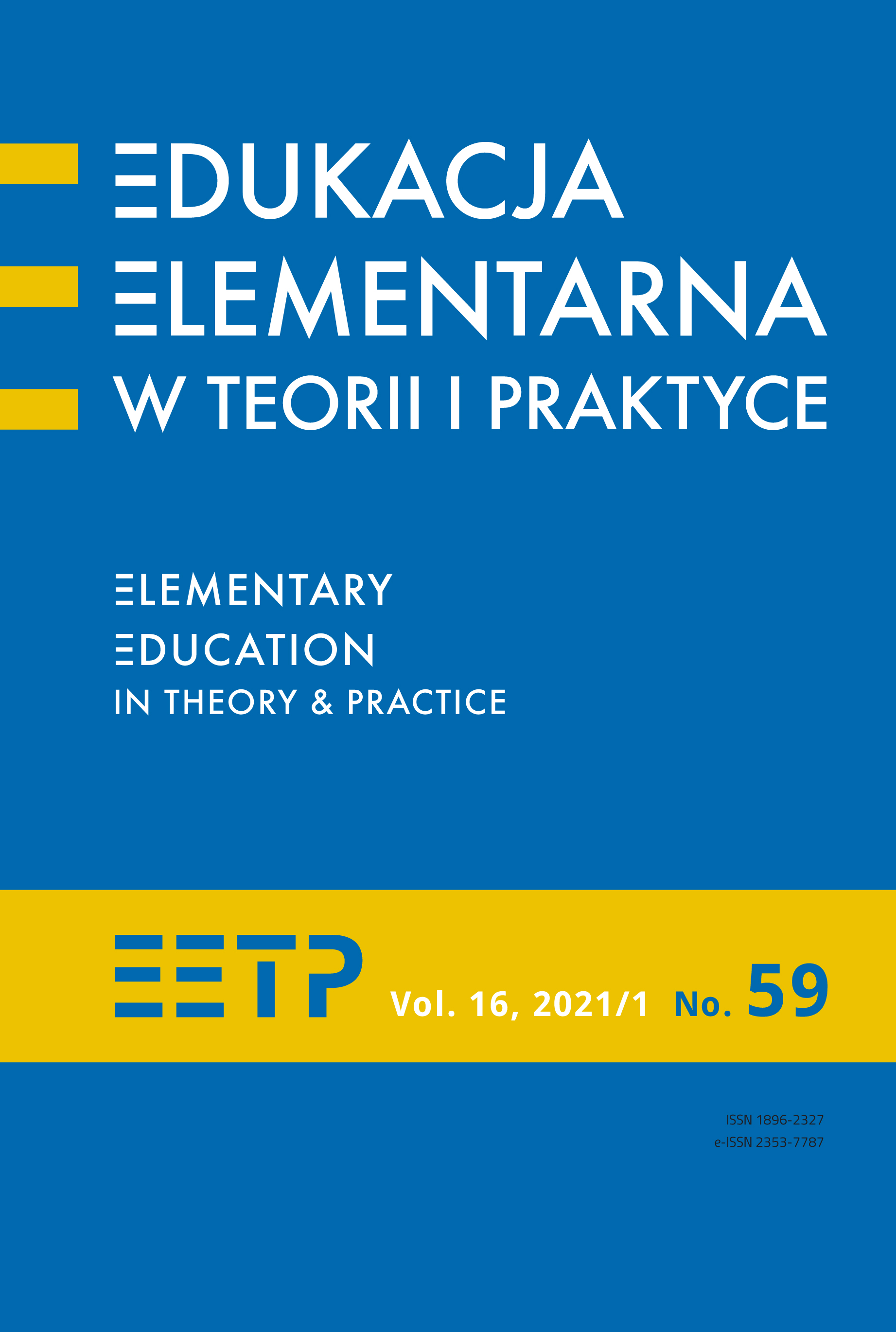Cultural Education of Early School Students in the Light of the Core Curriculum and the Textbook School Friends
Abstract
The aim of the article is to analyze the Core curriculum for comprehensive education in primary schools valid since September 2017, and early education textbooks of the WSiP publishing series: School Friends, in terms of cultural education. The author focused on the analysis of social values and norms as leading elements in the educational impact of the school, but also on the range of tangible and symbolic aspects of culture included in the above sources. In case of the core curriculum, the analysis of the documents includes the objectives of primary school education as well as the objectives and contents of education in grades 1-3. The study concerns the system of values that the authors of the textbooks want to pass on to future generations, and the attitudes they consider the most important. It also refers to the way in which the textbooks show reality in its various dimensions: social, material and political, taking into account the age and perceptual abilities of the recipients. According to the research results, in comparison to the accusations made against the previously applicable core curriculum, this one contains references to timeless values of good, truth and beauty, and to some specific values related to patriotism and civic education. Also, the authors of the current core curriculum place less emphasis on the creative attitudes of students and their knowledge of human achievements in the field of music or art. The authors of the textbooks emphasize teaching students social norms and values important both at school and in the family. The image of the world presented in the textbooks is somewhat idealized and stereotypical.
References
Bednarek S., Repsch E. (red.). (2004). Edukacja kulturowa dzieci i młodzieży szkolnej. Koncepcje i propozycje Wrocław: Wydawnictwo DTSK Silesia.
Bogaj A. (1998). Dylematy przemian kształcenia ogólnego, [w:] I. Wojnar, J. Kubin (red.), Kultura- inspiracją kształcenia ogólnego, Warszawa: Dom Wydawniczy ELIPSA, s. 185-198.
Encyklopedia pedagogiczna XXI wieku. Suplement. (2010) T. Pilch (red.), Warszawa: Wydawnictwo Akademickie „Żak”, s. 610-612.
Klus-Stańska D. (2009). Dyskursy pedagogiki wczesnoszkolnej, [w:] Pedagogika wczesnoszkolna – dyskursy, problemy, rozwiązania, Klus-Stańska D., Szczepska-Pustkowska M. (red.), Warszawa: Wydawnictwa Akademickie i Profesjonalne.
Kwieciński T., Śliwerski B. (2011). Pedagogika. Podręcznik akademicki, Warszawa: Wydawnictwo Naukowe PWN, t. 1.
Łobocki M. (2005). Teoria wychowania w zarysie, Kraków: Impuls.
Szyller A. (2018a). Ewaluacja podręczników zintegrowanych do edukacji wczesnoszkolnej. Perspektywa dorosłych, Warszawa: Wydawnictwa Uniwersytetu Warszawskiego.
Szyller A. (2018b). Ewaluacja podręczników zintegrowanych do edukacji wczesnoszkolnej. Perspektywa dzieci, Warszawa: Wydawnictwa Uniwersytetu Warszawskiego.
Uniwersalne wartości kultury w edukacji i terapii (2012). I. Nowakowska-Kempna (red. nauk.), Kraków: Akademia Ignatianum–Wydawnictwo WAM.
Wojnar I. (2000). Humanistyczne intencje edukacji, Warszawa: Wydawnictwo Akademickie „Żak”.
Zalewska E. (2009). Programy kształcenia i podręczniki szkolne w edukacji początkowej jako „wybór z kultury”, [w:] Pedagogika wczesnoszkolna- dyskursy, problemy, rozwiązania, D. Klus-Stańska, M. Szczepska-Pustkowska M. (red.), Warszawa: Wydawnictwa Akademickie i Profesjonalne.
Podstawa programowa wychowania przedszkolnego i kształcenia ogólnego dla szkoły podstawowej z komentarzem. Wychowanie przedszkolne i edukacja wczesnoszkolna. (2017). Ośrodek Rozwoju Edukacji. Warszawa: Dobra Szkoła.
Jabłońska A. M. ( 2019). Wychowanie do kultury: przeszłość i teraźniejszość, pytania i propozycje, „Seminare. Poszukiwania naukowe” t. 40, nr 3, s. 131-144. https://ojs.seminare.pl/index.php/seminare/article/view/384/400 [dostęp: 4.11.2020].
Pikała A.(2014). Edukacja kulturalna w szkole – założenia i determinanty realizacji „Kultura i Wychowanie” rr 7/1 https://pedagogika.pl/wp-content/uploads/2017/07/KiW_07_01_2014-1.pdf [dostęp: 4.11.2020].
Tytko M.M.(2011). O problemach kultury plastycznej w edukacji, „Kultura i Wychowanie” nr 2/2, s. 146-165, https://pedagogika.pl/wp-content/uploads/2017/07/KiW_02_02_2011-2.pdf [dostęp: 4.11.2020].
Koschany R., Skórzyńska A. (red.). (2014). Edukacja kulturowa Podręcznik, Centrum Kultury ZAMEK http://cpe.poznan.pl/wp-content/uploads/2014/07/CPE_porecznik_interaktywny.pdf
Zwinogrodzka W. (2014). Kanon kultury i polityka kulturalna (debata) https://polskawielkiprojekt.pl/2014/06/kanon-kultury-i-polityka-kulturalna/[dostęp:2.11.2020]
Copyright (c) 2021 Elementary Education in Theory and Practice

This work is licensed under a Creative Commons Attribution-NoDerivatives 4.0 International License.
- When submitting a text, the author declares that he/she is the Author of the article (hereinafter referred to as the “Work”) and:
- he/she owns the exclusive and unlimited copyright to the Work,
- is entitled to dispose of the copyright to the Work.
Declares that it does not infringe any third party copyrights or legal rights.
Declares that there is no conflict of interest.
2. At the same time, the Author grants the Ignatianum University in Cracowa royalty-free, non-exclusive and territorially unlimited licence to use the Work in the following fields of exploitation:
- recording the Work in a hard copy, as well as on a digital or magnetic medium;
- reproduction of the Work using any technique, without limitation of the number of editions or copies;
- distribution of the Work and its copies on any medium, including marketing, sale, lending, and rental;
- introduction of the Work into a computer memory;
- disseminating the Work in information networks, including in the Internet;
- public performance, exhibition, display, reproduction, broadcasting and re-broadcasting, as well as making the Work available to the public in such a way that everyone can have access to it at a time and place of their own choosing;
- within the scope of dependent rights to the Work, including in particular the right to make necessary changes to the Work resulting from editorial and methodical development, as well as to translate the Work into foreign languages;
The licence is granted from the moment of the transfer of the Work to the Ignatianum University in Cracow. The Ignatianum University in Cracow is entitled to grant further sub-licences to the Work within the scope of the right granted. The licence is time-limited and it is granted for a period of 15 years, starting from the date of its granting.
Authors are permitted and encouraged to publish their text online (e.g. in their institution’s repository or on the institution’s website) before or during the submission process as this may lead to beneficial exchanges, as well as earlier and greater citation of the published text (See The Effect of Open Access). We recommend using any of the following portals of research associations:
- ResearchGate
- SSRN
- Academia.edu
- Selected Works
- Academic Search




